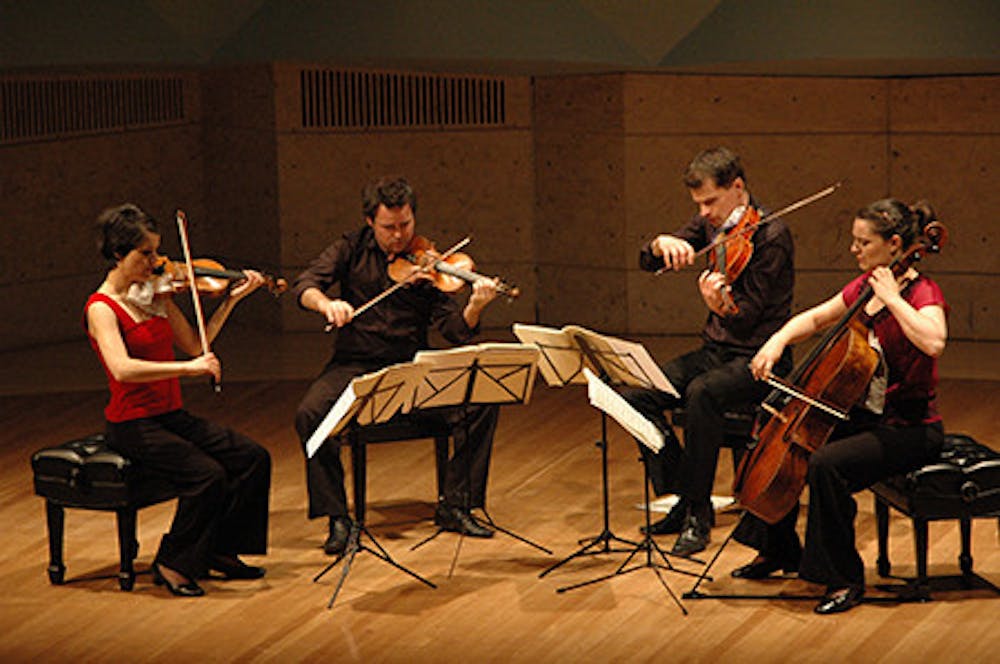This Saturday, two French/Catalan sisters, a Swede and a Scot cross the puddle to give the College one of the most vibrant and impassioned quartet performances of the millennia. The Elias String Quarter has risen like a meteor through the chamber music universe and into our own Performing Arts Series.
Too often students report the cost of arts events as barriers to their attendance. To that end, this concert will be completely free and open to the public. Be sure to come to the Kevin P. Mahaney ’84 Center for the Arts (MCA) Concert Hall slightly before 8 p.m. on Saturday, March 14, for great seating.
The Elias quartet is a relatively young ensemble, having debuted in 2012, but have been playing together for the past 17 years. This weekend they have chosen to perform Beethoven’s late quartets, three complex and incredible pieces.
The first piece that the Elias quartet will play tonight is the 11th quartet in F-minor. Beethoven started to write this piece in 1810, a particularly tumultuous time in Vienna, where he lived for most of his life. 1810 was the height of the Napoleonic campaigns across Europe, and Vienna, the capital of the Austrian-Hungarian empire, was under constant bombardment.
All of Beethoven’s composer-friends left the besieged city but him, although he complained endlessly about the constant noise of the bombardment. An eyewitness account from the time tells that the composer hid in his brother’s basement and covered his ears with pillows to protect the little hearing he had left at the time. Out of this chaos came the short but incredibly powerful 11th quartet, labeled Serioso by the publisher.
Beethoven never intended for this quartet to be played to the public, but rather planned for it to circulate in small settings amongst his composer and royal friends. When you hear Elias play it, you may understand why. The war brought out the character changes that transformed Beethoven’s heroic middle period into the genius late period.
This quartet, among other late pieces, does things that musicians at that time would not have dreamed of in their wildest dreams. Rapid outbursts, rapidly evolving motifs and an unprecedented use of silences characterize this wartime quartet. It is a piece that demands not only technical mastery, but also vibrancy and intensity. This piece matches the Elias quartet’s best traits.
Following the 11th, the Elias quartet will play the 16th quartet in F-major. This is the last significant work that Beethoven finished; he died in March of 1827, about five months after he completed the 16th quartet in October 1826. The most striking movement of this quartet is undoubtedly the finale, named by Beethoven Der schwer gefaßte Entschluß — “the difficult decision.” It starts with slow, dark chordal progression labeled muss es sein — “must it be?” and resolves into a nimble answer, labeled es muss sein! — “it must be!”
The 16th is a very flexible piece throughout. It moves from misty, bemused chordal cadences into complex, rapid counterpoint without fluttering an eyelid. It is another genius piece from Beethoven’s late period.
We step back a very small step in Beethoven’s biography to play the 14th quartet in C-sharp minor, completed in early 1826. Although any musicians reading this probably detest C-sharp minor (four sharps!), this is Beethoven’s favorite key. It is stoic, dramatic, complex and elusive, like the composer himself.
This quartet is almost twice as long as the 11th that Elias will begin the concert with, and many times it is more sophisticated. It captures leftover energy from Missa Solemnis, the grand choral mass written a few years earlier, that lends it a spiritual, puzzling tone. There is powerful melancholy present behind every note, written with a mastery that puzzled great composers for generations to come. After Franz Schubert heard this quartet, he said: “after this, what is left for us to write?” Robert Schumann remarked: grandeur [...] which no words can express. They seem to me to stand ... on the extreme boundary of all that has hitherto been attained by human art and imagination.”
Come to the MCA Concert Hall at 8 p.m. on Saturday, March 14, for this entirely free performance by one of the best quartets in the nation. Associate Professor of Music Larry Hamberlin will offer a pre-concert lecture at 7:00 p.m. in Room 221 for all interested.
Arts Spotlight: Performing Arts Series

Comments



